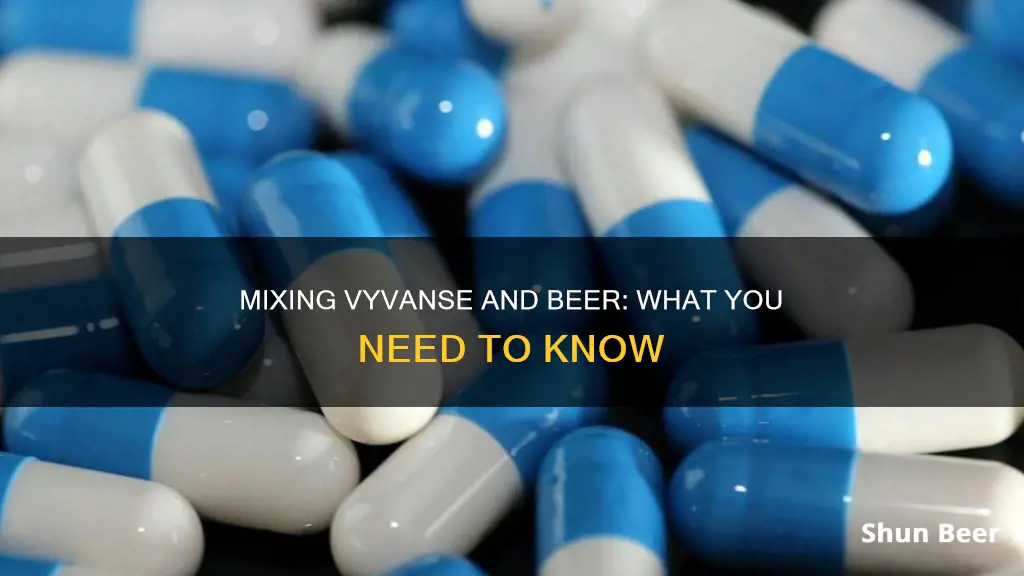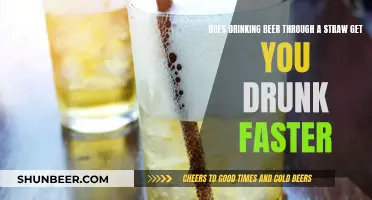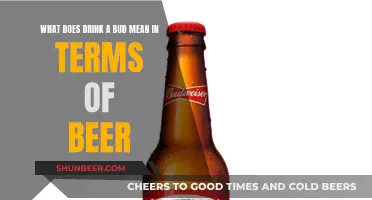
Vyvanse (lisdexamfetamine) is a stimulant medication used to treat attention-deficit hyperactivity disorder (ADHD) and eating disorders. It is a controlled substance with a high potential for abuse and physical dependence. While there are no specific warnings against drinking alcohol while taking Vyvanse, mixing the two can lead to dangerous side effects and health risks. These include an increased risk of cardiovascular issues such as increased heart rate, chest pain, and blood pressure changes, as well as alcohol poisoning, risk-taking behaviours, and an increased potential for addiction and polysubstance abuse.
| Characteristics | Values |
|---|---|
| Mixing Vyvanse and Alcohol | Not recommended due to serious health risks |
| Vyvanse | Stimulant medication |
| Alcohol | Depressant |
| Side Effects of Mixing Vyvanse and Alcohol | Dramatic changes in blood pressure, increased heart rate, feelings of euphoria, unusual behaviour, fatigue, alcohol poisoning, risk-taking behaviours, increased chances of psychosis, potential for addiction, liver damage, depression, anxiety |
| Vyvanse Side Effects | Insomnia, decrease in appetite, irritability, mood swings, behavioural problems, thought problems, bipolar illness, increased blood pressure, heart rate issues, blood circulation issues, stroke, heart attack, death |
| Alcohol Side Effects | Relaxed feeling, decreased coordination, decreased attention and memory, slowed response time, decreased responsiveness |
What You'll Learn

Increased risk of cardiovascular issues
Mixing Vyvanse and alcohol can have several cardiovascular side effects, increasing the risk of cardiovascular issues. The combination of the two substances can lead to dramatic changes in blood pressure, with studies showing that it increases blood pressure and heart activity to potentially dangerous levels. Hypertension, or high blood pressure, is a side effect of both alcohol and Vyvanse, and the risk of hypertension increases substantially when they are combined. This condition can lead to problems such as heart attack or stroke.
Additionally, arrhythmias, or abnormalities in the heart's electrical rhythm, are more likely to occur when alcohol and Vyvanse are mixed. The risk of arrhythmias is already elevated by alcohol and Vyvanse individually, but when combined, the risk becomes even higher. These abnormalities can be life-threatening and challenging to detect without hospital-grade heart monitors.
The masking effect of Vyvanse on alcohol's sedative effects can also contribute to increased cardiovascular risks. As Vyvanse hides the feeling of intoxication, individuals may consume more alcohol than usual, leading to alcohol poisoning, which can cause an individual to stop breathing and result in brain damage or even death.
Furthermore, both substances are known to cause liver damage when misused, and their combination may accelerate this damage. The increased alcohol consumption due to the masking effect of Vyvanse further exacerbates the potential harm to the liver.
In summary, the concurrent use of Vyvanse and alcohol can lead to a range of cardiovascular issues, including high blood pressure, arrhythmias, alcohol poisoning, and liver damage. It is essential to be aware of these risks and seek professional advice before considering mixing the two substances.
Beer and Sickness: What You Need to Know
You may want to see also

Potential for addiction
Vyvanse is a brand-name medication that treats attention deficit hyperactivity disorder (ADHD) and binge eating disorder. It is a controlled substance, which means it has a high potential for abuse and can cause addiction and withdrawal symptoms. Mixing Vyvanse with alcohol is dangerous and can lead to a higher risk of polysubstance abuse and an increase in risk-taking behaviours.
Both alcohol and Vyvanse are highly addictive substances, and misusing them together can lead to a substance use disorder. Taking higher doses of prescription drugs like Vyvanse than prescribed or using them without a prescription is considered drug abuse. Heavy alcohol use, defined as consuming more than four drinks a day for men and more than three drinks a day for women, increases the likelihood of developing an alcohol or Vyvanse addiction.
Mixing Vyvanse and alcohol can also lead to risky behaviours such as driving while intoxicated, violence, criminal offences, or unsafe sexual interactions. This is because the stimulant effects of Vyvanse can mask the feeling of drunkenness, leading to alcohol poisoning and its deadly complications. Additionally, the combination of a stimulant and a depressant can result in overdose as the depressant effects of alcohol counteract the stimulant effects of Vyvanse, overwhelming the central nervous system with opposing commands. This may lead users to disregard caution and take more doses of Vyvanse, increasing the risk of overdose.
The detox and rehabilitation process for polysubstance abuse is also much more complicated. If you or someone you know is struggling with addiction to Vyvanse and alcohol, professional addiction treatment is recommended.
Beer Drinkers and Alcoholism: Understanding the Risks
You may want to see also

Alcohol poisoning
While the manufacturer of Vyvanse does not offer any warnings about drinking alcohol while taking the drug, there are other reasons to be cautious. Vyvanse is a central nervous system (CNS) stimulant, and when combined with alcohol, CNS stimulants can mask the effects of being drunk. This means you may drink more than you normally would without feeling the effects of the alcohol, increasing your risk of alcohol poisoning.
Signs of Alcohol Poisoning
- Mental confusion, stupor, or slurred speech
- Poor coordination or stumbling
- Trouble staying awake
- Slow breathing (fewer than eight breaths per minute)
- Long pauses between breaths (10 seconds or more)
- Low body temperature
- Bluish, gray, or pale skin
- Slow responses (such as a gag reflex)
What to Do If You Suspect Alcohol Poisoning
If you think someone you're with has alcohol poisoning, take the following steps:
- Call 911 right away.
- Don't leave the person alone.
- Try to keep them awake and seated upright.
- Have them sip water if they're conscious.
- Cover them with a warm blanket.
- If they're unconscious, roll them onto their side to prevent choking on vomit.
- Tell the paramedics about their symptoms and how much they drank.
Preventing Alcohol Poisoning
If you're going to drink alcohol, keep these tips in mind:
- Drink in moderation. It's best for men to have no more than two drinks a day and for women to have only one.
- Alternate alcoholic drinks with non-alcoholic ones, preferably water.
- Don't drink on an empty stomach. Food slows down the absorption of alcohol to some extent, although it can't prevent alcohol poisoning if you're drinking a lot.
- Don't drink while taking prescription medications or other drugs. Some drugs interact badly with alcohol.
- Don't play drinking games or use funnels or beer bongs.
- Store alcohol safely. Keep products containing alcohol, such as mouthwashes and cold medicines, out of the reach of children.
Beer and Cephalexin: A Safe Mix?
You may want to see also

Increase in risk-taking behaviours
Mixing alcohol and Vyvanse can lead to an increase in risk-taking behaviours. This is primarily due to the fact that Vyvanse can mask the effects of alcohol, making it harder to tell when you're drunk. As a result, individuals may engage in activities that they wouldn't normally do when sober, such as:
- Driving under the influence
- Getting into a vehicular accident
- Getting into a physical altercation
- Having a regrettable sexual experience
- Becoming a victim or perpetrator of sexual assault or crime
- Inflicting self-harm
These risks are heightened because individuals mixing Vyvanse and alcohol may not realise the extent of their impairment, thus becoming a danger to themselves and others.
Additionally, the combination of Vyvanse and alcohol can increase the likelihood of polysubstance abuse and the development of an alcohol addiction. This is especially true for individuals with ADHD, who are already at a higher risk for substance abuse problems.
The stimulant effects of Vyvanse can also lead to an increased heart rate and blood pressure, which can be dangerous for individuals with pre-existing health conditions. Therefore, it is crucial to consult a doctor before consuming alcohol while taking Vyvanse to ensure it is safe for your specific situation.
Antidepressants and Alcohol: Is It Safe to Mix?
You may want to see also

Increased chances of psychosis
Mixing Vyvanse and alcohol can lead to an increased chance of psychosis. Psychosis is a condition that causes a detachment from reality. This condition is much more likely to occur when alcohol and Vyvanse are mixed than when they are used individually.
Vyvanse is a stimulant that enhances and speeds up the body's overall function. It is primarily used to treat attention-deficit hyperactivity disorder (ADHD) and eating disorders. Alcohol, on the other hand, is a depressant that suppresses brain activity and the body's overall function. When these two substances are combined, they create conflicting processes in the body that can lead to unhealthy effects.
The side effects of Vyvanse include insomnia or trouble sleeping, decreased appetite, irritability, and mood swings. The less common but more serious side effects include new or worsening behavioural problems, new or worsening thought patterns, worsening symptoms of bipolar illness, increased blood pressure and heart rate, issues with blood circulation, and sudden stroke, heart attack, or death.
The side effects of alcohol use include a relaxed, uninhibited feeling, decreased coordination, decreased attention and memory, slowed response time, and decreased responsiveness. When mixed with Vyvanse, alcohol can mask the effects of being drunk, leading to an increased risk of alcohol poisoning and injuries from alcohol use, such as falls.
The combination of Vyvanse and alcohol can also lead to an increase in risk-taking behaviours, such as driving under the influence, getting into physical altercations, and engaging in unsafe sexual interactions. This is because the stimulant effects of Vyvanse can hide how drunk an individual really is, leading them to consume more alcohol than they normally would.
In addition, both alcohol and Vyvanse can increase the risk of psychosis, especially in large amounts. This is especially true for individuals who already have a mental illness such as bipolar disorder or schizophrenia. Mixing Vyvanse and alcohol can cause or exacerbate the signs and symptoms of psychosis, including paranoia, hallucinations, and delusions.
Drinking Alcohol-Free Beer: Is It Safe to Drive?
You may want to see also
Frequently asked questions
No, it is not recommended to mix Vyvanse and alcohol.
Mixing Vyvanse and alcohol can cause an increase in blood pressure and heart activity to potentially dangerous levels. It can also lead to alcohol poisoning as the stimulating effects of Vyvanse can hide the effects of being drunk, causing you to drink more than usual.
Side effects may include dramatic changes in blood pressure, increased heart rate, feelings of euphoria, unusual behaviour, and periods of fatigue or general malaise.
Long-term risks include an increased likelihood of alcohol misuse, a higher risk of polysubstance abuse, and an increase in risk-taking behaviours.
If you are struggling with addiction to Vyvanse and alcohol, it is important to seek professional help. Treatment for this type of addiction typically includes an intake interview, assessment, detoxification, and a comprehensive recovery program that addresses personal issues and co-occurring psychological disorders.







